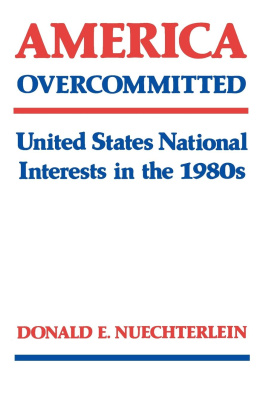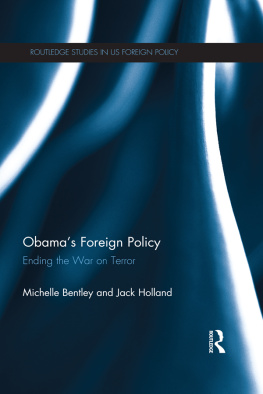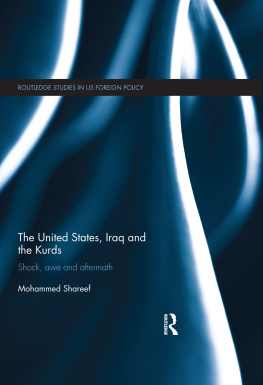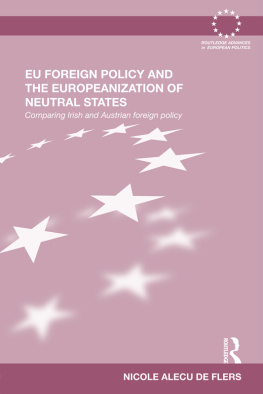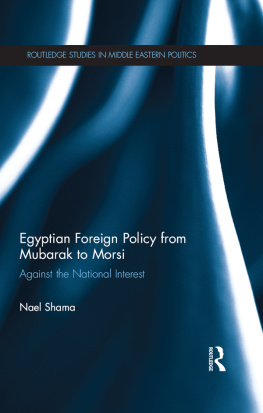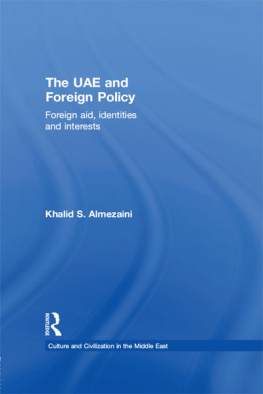United States
National Interests
in a Changing
World
Donald E. Nuechterlein
United States
National Interests
in a Changing
World
ISBN: 978-0-8131-5412-1
Library of Congress Catalog Card Number: 7377255
Copyright 1973 by The University Press of Kentucky
A statewide cooperative scholarly publishing agency serving Berea College, Centre College of Kentucky, Eastern Kentucky University, Georgetown College, Kentucky Historical Society, Kentucky State University, Morehead State University, Murray State University, Northern Kentucky State College, Transylvania University, University of Kentucky, University of Louisville, and Western Kentucky University.
Editorial and Sales Offices: Lexington, Kentucky 40506
To Millie and Jonathan
CONTENTS
PREFACE
THE PURPOSE of this study is to provide policy-makers, scholars, and serious students of international affairs with a framework for assessing United States national interests in the 1970s by learning from the experience of the postWorld War II era and asking some searching questions about what kind of role the United States wishes to play in the world in the future. The study is concerned with the problem of making foreign policy the handmaiden of national interests, rather than having interests predetermined by past policies and institutional prejudices. It is also concerned with executive-legislative relationships in the determination of United States national interests and the means by which the Presidents perception of national interests is subjected to checks and balances of Congress without depriving him of the authority to make critical decisions when the nation is threatened with a grave international crisis.
Robert Osgood, in his introduction to America and the World: From the Truman Doctrine to Vietnam, wrote: What are Americas vital interests and how should it use its power to support them? This is the fundamental foreign policy question facing the United States after two decades of the Cold War. Both statements reflect a growing awareness of the need for greater precision in defining the United States national interests and in distinguishing among the different degrees of interest, or stake, which the United States has in various foreign policy issues it now faces. The fact is that the United States, for all its wealth, is not willing to continue expending so high a proportion of its resources on foreign affairs as it has in the past. This means that costs must be given a far greater role in future assessments of the degree of interest the United States has outside its own territorial limits.
This study assumes that the United States will continue to play a great power role in the future, that it will not return to the isolationism of the past, and that the crisis of conscience which affected a large proportion of Americans in the postVietnam period will eventually give way to a mood of greater realism about Americas role in the world and its ability to shape the course of history. It is not my purpose here to debate whether American policy in Vietnam was moral or immoral; that issue is best left to philosophers. Rather, I am concerned with finding a better way of defining United States national interests in the future, interests which are compatible with the values and sentiments of the American people not just American leaders. Finally, I believe that the American system of government is capable of responding to the changing attitudes of the people in foreign affairs, and that it will continue to do so.
In a previous volume, I suggested that the final judgment about whether United States military intervention in Vietnam was a wise policy or not would be decided by the American people and Congress on the basis of the costs involved in that effort. By 1968 it was clear that the costs of the Vietnam intervention were far greater than the American people were prepared to accept and the withdrawal of United States ground forces from that conflict without a military decision was evidence that the American people ultimately decide the outer limits of national interests. Yet, a more important question is whether the value of Vietnam in relation to United States worldwide interests warranted the massive use of American military power and economic resources there. A similar question could be posed for any potential United States intervention elsewhere, in the Middle East, Latin America, or the Indian Ocean area: what is the measure by which the President decides that American interests are so threatened, i.e., that the interest is a vital one, that he must contemplate the possible use of armed force to defend them if all other measures fail? This is a central question of this study.
I am indebted to colleagues at the University of Virginia and at the Federal Executive Institute, as well as friends in government, for their help in sharpening the ideas contained in this volume. The final product, however, is fully my responsibility.
(Baltimore, Md., 1970), p. 1.
Department of State Bulletin 63, no. 1644 (December 28, 1970): 782.
Thailand and the Struggle for Southeast Asia (Ithaca, N.Y., 1965), p. 267.
1
The Concept if National Interest
THE TERM national interest has long been used by statesmen and scholars to describe the foreign-policy goals of nation-states. Charles Beard, in The Idea of National Interest, traced the evolution of the phrase from the first nation-states down to the twentieth century and described the historical interests of the United States in essentially economic terms. Walter Lippmann, in U.S. Foreign Policy: Shield of the Republic, sought to define United States defense interests in the postWorld War II period, drawing on the isolationist experience of the interwar period.
Although the concept of national interest is not new, there has long been considerable ambiguity about its meaning, and most scholars have chosen their own descriptions rather than formulations offered by others. Today the student of international relations finds numerous definitions of national interest, most of which are not conducive to precision in the making of foreign policy. Before attempting a more adequate definition, however, it is well to review briefly what the principal American writers on United States foreign policy have said about the nature and roots of the nations interests, particularly after the United States became a great power early in this century.
Writing in the 1930s, Beard was principally concerned with what might be called the national economic interest. He argued that the founding fathers, particularly Washington and Hamilton, had a clear perception of what their new nations interests had to be in order to survive: self-interest rather than sentiment, and a deep appreciation of the limited means available to carry out its policies. Beard believed that the basic national interest of the United States during the first hundred years of its history was an economic interest and that the two major political parties in the country sought to define this economic interest to suit their own purposes. The commercial groups in the East were primarily interested in overseas trade and opposed to westward expansion of the nation across a vast continent. The landed gentry of the South and West, however, favored adding new lands in the West in order to build the political influence of farmers and reduce the power of the Eastern commercial groups. Hamilton and Jefferson were the initial spokesmen of these two forces, which dominated American politics until the Civil War, and also represented the basic cleavage over what Americas role in the world ought to be. Beard points out that the two groups differed also on means for carrying out the nations foreign policy: Eastern commercial interests favored a strong navy and commercial concessions in foreign countries, even overseas bases; the landed interests, on the other hand, opposed overseas involvements and pressed for the acquisition of new territories from Spain, France, and Mexico sometimes through treaty and at other times through war. National security was not a principal concern of the United States, except for a brief period during the War of 1812, because no foreign power had the capability of invading the country and forcing it to submit to its will. The Monroe Doctrine was a feasible policy because of the support of the British Navy in the Atlantic. Thus, the new nations interests could afford to be based on economics rather than on military power.


